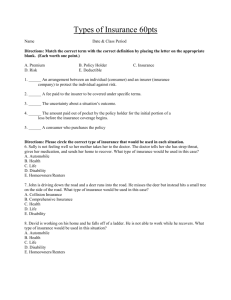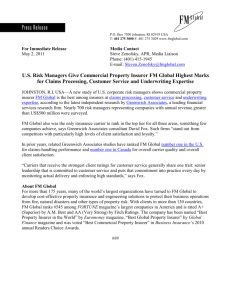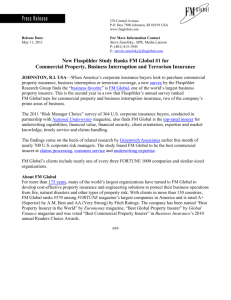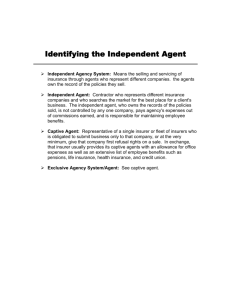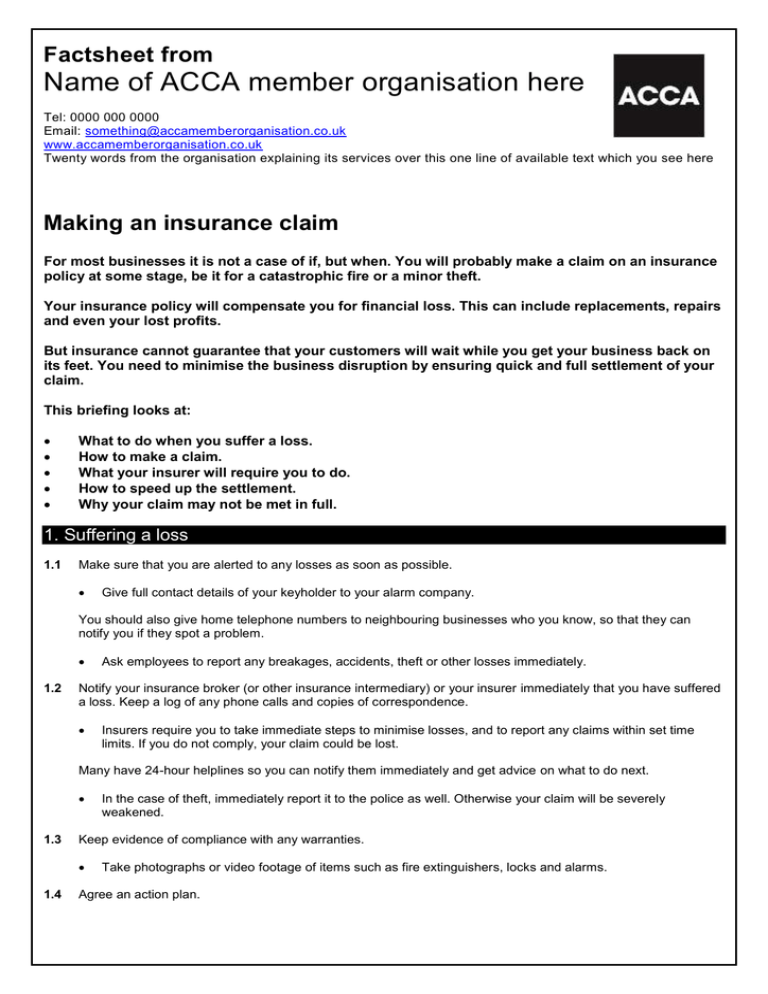
Factsheet from
Name of ACCA member organisation here
Tel: 0000 000 0000
Email: something@accamemberorganisation.co.uk
www.accamemberorganisation.co.uk
Twenty words from the organisation explaining its services over this one line of available text which you see here
Making an insurance claim
For most businesses it is not a case of if, but when. You will probably make a claim on an insurance
policy at some stage, be it for a catastrophic fire or a minor theft.
Your insurance policy will compensate you for financial loss. This can include replacements, repairs
and even your lost profits.
But insurance cannot guarantee that your customers will wait while you get your business back on
its feet. You need to minimise the business disruption by ensuring quick and full settlement of your
claim.
This briefing looks at:
What to do when you suffer a loss.
How to make a claim.
What your insurer will require you to do.
How to speed up the settlement.
Why your claim may not be met in full.
1. Suffering a loss
1.1
Make sure that you are alerted to any losses as soon as possible.
Give full contact details of your keyholder to your alarm company.
You should also give home telephone numbers to neighbouring businesses who you know, so that they can
notify you if they spot a problem.
1.2
Ask employees to report any breakages, accidents, theft or other losses immediately.
Notify your insurance broker (or other insurance intermediary) or your insurer immediately that you have suffered
a loss. Keep a log of any phone calls and copies of correspondence.
Insurers require you to take immediate steps to minimise losses, and to report any claims within set time
limits. If you do not comply, your claim could be lost.
Many have 24-hour helplines so you can notify them immediately and get advice on what to do next.
1.3
Keep evidence of compliance with any warranties.
1.4
In the case of theft, immediately report it to the police as well. Otherwise your claim will be severely
weakened.
Take photographs or video footage of items such as fire extinguishers, locks and alarms.
Agree an action plan.
1.5
Check on what you must and must not do next. For instance, you may be asked to leave flood-damaged
stock where it is, pending an insurance assessment.
Confirm when you can expect a response from your insurer. You will then know when you can start chasing
your claim.
Ask for an estimate of how long it will take your insurer to settle your claim.
Take action to prevent any further losses.
1.6
Your policy may stipulate that you should take certain actions.
Most insurers will have a list of 24-hour emergency repair services.
Premises must be secured as quickly as possible in the event of damage to windows or doors, burglary, fire
or flood.
If there is water damage, clean up and dry out damaged goods, equipment or buildings (but see 1.3).
In the case of major disruption, put your disaster recovery plan into action.
This minimises disruptions to your business while your claim is being settled.
If you cannot deliver supplies for weeks or months because you have no disaster recovery plan, your
business could fail.
If you do not have a disaster recovery plan, ask your insurance adviser and your insurer for advice on this
matter.
2. Making a claim
For your claim to be accepted and paid in full, you must follow certain procedures.
2.1
Check your policy to make sure you are covered for the specific loss suffered.
2.2
Assess your loss to make sure you are claiming for the full costs of repairs, replacements or financial losses.
Once your insurer has settled the claim, you will not be able to go back to ask for more.
2.3
For example, you may not be able to claim for a computer theft if the thief could simply walk into your office.
Your policy may only cover burglary, which requires forced entry to the premises.
If you cannot put a value on your claim, ask your insurer, broker or a professional loss assessor for advice.
Many insurers provide 24-hour helplines.
Keep the receipts for any incidental costs, such as additional cleaning following a flood or the cost of
equipment rental following a fire. You may be able to add these costs to your claim.
Find out as much as you can about the circumstances surrounding the claim.
Your insurer will want to know how, when and where the loss occurred.
For example, if you were taking your day’s takings to the bank and were mugged, you should give details of the
time, place, which police station was notified, the crime number and witness contact details.
2.4
Provide your insurer with all the specific information that is requested.
Your insurer or insurance broker will usually send you a claim form.
Ask them or your loss assessor for advice on filling out the form. Your claim may be delayed or rejected if
you give incorrect or insufficient information.
3. Claims processing
Your insurer will not agree to any repairs, replacements or financial compensation until satisfied that your claim, and
the amount claimed, are genuine.
2
3.1
Simple claims are settled more quickly. Provide your insurer with as much detail as possible. This will help speed
up your claim.
If your claim is for a broken shop window or a damaged car and the insurer has an approved repair firm, the
work may be done in a matter of hours. You may not even have to fill in a claim form if the insurer settles
directly with the repair firm.
Claims for theft, fire or flood will usually be settled in weeks or months.
Litigation, such as liability claims, is governed by the Civil Procedure rules, with timescales laid down for
every stage of the process.
You must inform your insurer immediately if a claim is being made against you.
3.2
Your insurer will check your claim form to ensure:
3.3
Your loss is covered by the insurance policy and is not specifically excluded.
You have provided all the information that is required.
Your policy is still valid and you have paid your premiums.
Your insurance company may appoint a loss adjuster to visit your business to advise you on what to do to get
your business running smoothly again.
The loss adjuster will check that:
3.4
You are not claiming too much or too little.
You have met the terms and conditions of your policy, including compliance with all warranties.
You are not underinsured.
The loss adjuster or insurer may then ask you to provide additional information. For example:
Receipts or other proof of purchase.
Proof that regular maintenance and safety inspections were undertaken.
Evidence that the claim is for an insured risk (if this is in doubt).
For example, contamination caused by a hazardous chemical spillage is usually excluded by insurance policies.
4. Potential pitfalls
Your claim may not be met in full. It may even be completely rejected. Unfortunately you will only ever discover that
your insurance was inadequate when you come to make a claim.
In order to make the most of any claim after the event, there are a number of things you should check when placing
your insurance cover.
4.1
When choosing an insurer, do not just compare premiums. Compare the scope of cover provided, as well as
additional services such as a 24-hour helpline.
4.2
Check that you comply with your insurer’s terms and conditions.
Did you meet the disclosure requirements?
For example, failure to declare past burglaries or other relevant facts could lead to your claim being rejected.
4.3
Did you meet the security and safety requirements? For example, switching on your burglar alarm, keeping
the premises secure and keeping cash in the safe.
Check that you are not underinsured.
Are your buildings, equipment, assets or profits insured for the correct amount?
3
Your claim will be reduced in proportion to the amount you failed to insure for.
4.4
Check that you will be paid the full replacement cost, known as ‘reinstatement’.
Insurers will pay either a cash amount equivalent to replacing the damaged or destroyed property ‘as new’ or
pay for work to be carried out to bring the property back to its original condition.
In both cases, the amount paid will not exceed the sum insured.
Most policies have a ‘betterment’ clause which excludes the full cost of replacing lost or damaged assets
with better ones.
For example, replacing your six year-old cash tills with two (much better) new ones.
This is betterment and you may have to pay towards the cost of the upgrade.
4.5
Check how much you must pay towards each claim — the policy ‘excess’.
4.6
You may have to adjust your insurance cover to replace equipment that becomes obsolete rapidly, such as
computers.
Replacing equipment that is no longer available can be a major problem.
For example, you may have to pay the first £1,000 of any claim you make.
Check that you are following the correct claims procedure.
Notifying your insurer of a loss does not automatically mean you can undertake repairs, or buy replacement
items, or remove any remains or damaged goods. You may be removing the evidence.
Agree everything with your insurer first.
5. Quick and full settlement
5.1
Keep detailed documentation of all information needed to support your claim.
Keeping accurate records of what you own makes it easier to assess the scale of your losses.
Your claim may be rejected if you have not kept records of fire and security inspections, maintenance logs,
or health and safety procedures.
Ideally, keep duplicate records off site.
5.2
Do not cause delays in settling the claim.
5.3
If you are asked for three estimates, do so.
Reply to all correspondence quickly.
If you are unsure of what information to provide, ask your insurer or broker for advice. Do not wait for the
insurance company to contact you.
Get expert help to argue your case. Support your claim with evidence.
Insurance brokers and advisers may chase up claims free of charge. And they have experience of dealing
with insurance companies on a daily basis.
For larger or more complex claims, consider using your own expert loss assessor to manage the claim and
any negotiation on your behalf.
This will usually cost you 10% of the claim payment, but this should be offset by the increased speed and value
of the settlement. It will also leave you free to concentrate on rebuilding your business.
4
Consider appointing a solicitor to assist with the preparation of any witness statements.
If your insurer appoints a forensic scientist to determine the cause and site of a fire, consider appointing one
yourself.
5.4 Good contingency plans make the settlement process less urgent (see 1.5).
This can strengthen your negotiating position.
For example, keep back-ups of all computer records.
If your equipment fails or your computers are stolen, you can hire computers and keep your business running.
5.5
Ask for interim payments if the claim is taking a long time to settle, or the loss is putting a financial strain on your
business.
Most insurers will accept interim claims and agree to make interim payments, however they are not offered
automatically.
6. Once the claim is settled
An insurance claim may have repercussions for the way you do business.
6.1
Establish how you can prevent further losses in the future.
Your insurance company may undertake a post-loss survey to re-evaluate the risks your business faces.
It will then recommend ways to reduce future potential losses.
6.2
Your insurer may impose additional policy terms and conditions.
For example, if your shop windows have been broken more than once, your insurer may insist on metal
grilles or special glass to lessen the risk of further claims.
Check that your local authority will give approval.
6.3
An insurance claim can push up future insurance costs.
6.4
Or your insurer may insist on better security equipment after a burglary.
As well as a possible increase in your premiums, your insurer or adviser may insist on a higher policy excess
(see 4.4).
A poor claims record can lead to your insurer refusing to renew your policy.
Managing your claim
When you make a claim, your insurance broker or adviser should help you complete the claim form, telling you what
you can claim for and chasing up the progress of your claim. Although this service is free, your relationship with your
insurer, broker or adviser is a commercial one, so you should be provided with on-going support and advice. Because
you will rely on this service, ensure that your insurance adviser or broker is on top of the situation:
Agree the time of your next meeting or telephone call. You will then know how long you need to wait and
when to start chasing up your claim.
Agree a timescale, so you know when the claim will be settled.
Ask to be kept regularly informed of the progress of your claim.
If there is undue delay, ask for a meeting with your contact and either the loss adjuster or a representative of the
insurer.
5
Expert contributors
Thanks to Neil Cook (Equity and General Insurance Services Ltd, 01788 551 616)
Last reviewed 01.04.12
© BHP Information Solutions 2012. ISSN 1369-1996. All rights reserved. No part of this publication may be reproduced or transmitted without the
written permission of the publisher. This publication is for general guidance only. The publisher, expert contributors and distributor disclaim all liability
for any errors or omissions. Consult your local business support organisation or your professional adviser for help and advice.
6


